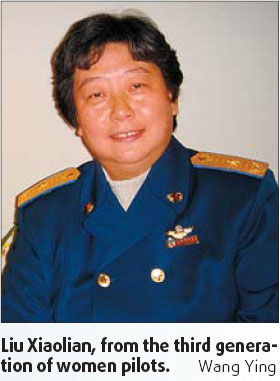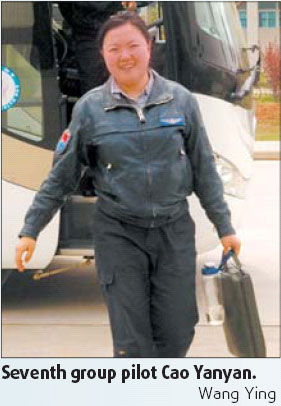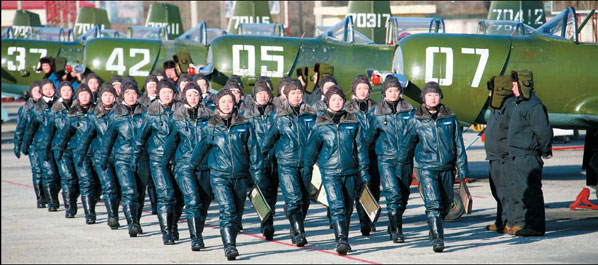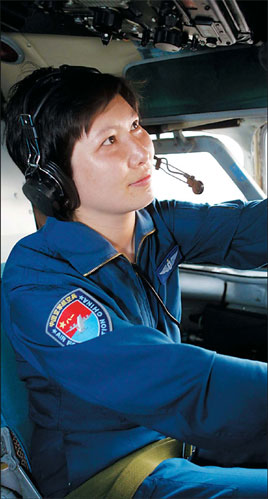Sky's not the limit
|
The eighth group of young women pilots of China's Air Force receive training in Harbin, Heilongjiang province. Bai Yubo |
Air Force pilot Cao Yanyan, 29, woke up from a dream recently and found her pillow wet with tears.
In her dream, the army decides to send her to university for post-graduate education - an opportunity that most soldiers would grab.
But not Cao. "I don't want to go, I want to fly!" she cried in her dream.
A captain at an air base in Hubei province, Cao says: "I can trade anything for flying as I love the feeling of being in the sky."
"When I fly in the rosy sunglow of dawn, I feel I have so much to look forward to in life, and when I fly over a sleeping city after midnight, I see the twinkling street lamps and feel an immense tranquility," she says.
A skilful pilot with about 10 years of experience in the air, Cao still feels a sense of amazement every time she sits in the cockpit. "Every day is different when I am flying."
|
Liu Wenli, from the sixth group of women pilots. Shen Ling |
In the past several years, Cao and her peers have been assigned many tasks including cargo aircraft piloting, artificial rain making, navigation, military maneuvers and disaster relief.
Cao was born into an Air Force family with her father a pilot and mother, a ground service personnel, Cao spent most her childhood leisure time on the training ground of an Air Force base in Jinan, Shandong province.
"On my birthday in 1996, my mother gave me a copy of a newspaper notice saying that the Air Force would be recruiting the seventh group of women pilots in 1997 from high school graduates," Cao recalls.
"It was the best birthday present I ever got," she says.
On a mild spring day earlier this year, Cao gets up at 6:30 am.
After breakfast, she begins preflight checks at a nearby military airport and at 8:30 am, she takes off.
With a crew of four, she flies four-and-a-half hours for an aerial photograph task that day.
Piloting a plane rarely requires much physical effort. However, the stress of being constantly alert and ready to handle emergencies can be very tiring. Besides, irregular eating and sleeping patterns because of frequent schedule changes, can contribute to physical fatigue.
Cao's most dangerous moment in flying came several years ago when the engine of her single-engine aircraft stopped rolling for a split second in mid-air.
The plane made a sudden dip as it lost propeller power, and Cao's head crashed into the craft's roof. "Blood trickled down my face but I kept calm," she recalls.
Fortunately, the engine began working soon after and she made a safe landing.
Cao considers herself lucky to have been able to fulfill her childhood dream. She is in the company of more than 300 other such lucky girls since the Chinese Air Force began recruiting female pilots in 1951.
Boasting one of the largest contingents of women pilots in the world, the Chinese Air Force used to recruit a batch of women pilots every seven or eight years.
Cao is from the seventh such group. Since 2005, the force has been recruiting women pilots every three years. This year, it will take in 30 women pilot cadets, who will form part of a reserve force of women astronauts.

The candidates are all high school graduates aged between 16 and 19 from 16 provincial areas across the country. They will first spend four years in the Aeronautics University of the Chinese Air Force and pursue a Bachelor's degree in engineering. Following another year of advanced flight training, they will be granted a Bachelor's degree in military science.
China, which successfully conducted its first manned space flight in October 2003, plans to send a female astronaut into space in three to five years.
The idea of training women pilots was first raised by Deng Yingchao, a top government official and wife of late premier Zhou Enlai, shortly after New China was established in 1949.
Fifty-five outstanding young military women were recruited in 1951 and after less than a year of intensive training, the first group of women pilots pinned on their wings.
On March 8, 1952, International Women's Day, China's first batch of women pilots flew over Tian'anmen Square in downtown Beijing watched by thousands of people, including foreign envoys and media.
The high-profile show caused a worldwide sensation, says Liu Xiaolian, 58, an Air Force major general from the third generation of women pilots.
"It showed that we Chinese women really hold up 'half the sky'," Liu says.
The training period for pilots has grown over the past half century, from less than a year to four years studies in a military university.
The sixth group of women pilots, who graduated in 1993, was the first to hold Bachelor's degrees in strategy. "The younger generation has better education and can pick up new ideas quickly, though those who have grown up as the only child in their families may not be mentally prepared for the hardships ahead," Liu says.
The country's first woman pilot to be given the Creditable Pilot Medal, the country's top award for pilots, Liu says she will never forget what chairman Mao Zedong told the women pilots decades ago - "You should become the real pilots for the people not just performers."
The medal was given to her in honor of her special contribution to Air Force after a successful force landing when her plane was hit by another during a routine task in 1982.

She was injured badly and her plane was on the verge of crashing when she engineered a miracle by landing safely, not only saving her crew of seven but also another six fighter planes parked at the airport.
The accident left her with permanent injuries to her lumbar vertebra but she still managed to continue flying and has an accumulated 4,000 hours in air.
Zhang Jianchang, 38, a male pilot at the Hubei air base says, "when they put on their flight uniforms, they are ready to go into battle."
But at home, the women pilots can be a caring wife and mother.
Air force colonel Liu Wenli and her husband Ma Yong were chosen as one of the country's top 10 modern model love couples by the All-China Women's Federation in 2006.
Their love story is legendary.
The only woman flight brigade commander in the Chinese Air Force, Liu Wenli, from the country's sixth group of women pilots, was diagnosed with breast cancer in 2004 when she was 33 years old and her daughter was only 2.
After an operation, she returned to the skies in less than a year, thanks to the care and support of her husband and her own positive attitude. "I was shocked when I was diagnosed with breast cancer at the height of my career," Liu recalls. "I thought I would have to quit flying and felt as if the light of life had been extinguished."
To make matters worse, this slim and beautiful woman from Shandong province was told she would lose a breast during surgery. "I even once refused to have the operation," she recalls. But her husband's words changed her mind.
"What I care for most is that our daughter should not lose her mother and I, my wife," he says.
With intensive post-surgery rehabilitation, she returned to the skies in mid-2005. She is the pride of her family and is called "swan mother" by her daughter who calls herself "little swan".
(China Daily 05/14/2008 page18)
















